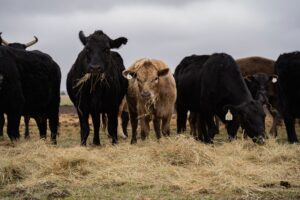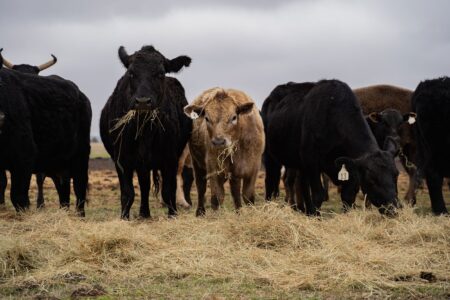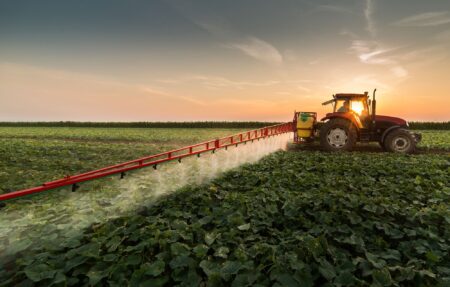By Morgan Chilson
TOPEKA — Kansas farmers and ranchers are paying close attention to tariffs and whether other countries will show up for negotiations, and they need a farm bill to pass in Washington, two agricultural experts said.
Alan Featherstone, head of the Agricultural Economics department at Kansas State University, and Hal Luthi, president of the Kansas Cattlemen’s Association and a third-generation rancher in Madison, both spend part of their days studying what’s happening in Washington.
Everything there has an effect on Kansas agriculture, Featherstone said, rattling off a quick list: trade policy, energy policy, interest rates, passage of a farm bill, crop and livestock insurance, and tax policies.
“There’s just so much uncertainty in the air until Congress and the president begin to resolve some of those policy differences,” he said.
“You compound that with the fact that most of Kansas agriculture did not have good years in 2023, 2024 — most of the income, at least on crop operations, came through government payments,” he said. “I would suspect once the Kansas Farm Management numbers are released that roughly 50% or more of income came from [government payments].”
“Probably the only thing that is going well right now is the cow-calf operations; even the feeder operations are struggling,” Featherstone said.
Farm Bill Passage
Uncertainty is difficult but Luthi is focused more on whether or not a farm bill will move on.
“The ineptitude of our federal government to pass a new farm bill is certainly adding to all this because, well, we’re heavy users of the livestock risk insurance, and we don’t know what the future of that program is,” he said. “So if we’d had the farm bill enacted when it should have been, well, that would certainly have alleviated a lot of the concerns people have.”
But uncertainty in general, Luthi added, is something farmers are used to.
“We kind of operate on an almost daily basis of uncertainty out here in the countryside anyway, because we don’t know if it’s going to rain,” he said. “We don’t know what world events are going to affect our markets.”
Trade and Kansas
International trade is an important part of the Kansas agricultural economy, Luthi said.
“China has been a big purchaser of our soybeans and corn,” he said. “But also I think that that’s a two-handed approach. I feel like maybe they need us as bad as we need them, and at some point in time we’re going to come together and come to an agreement.”
Featherstone, whose work is often focused on international markets, said China imported about $1.5 billion of U.S. beef.
“To give an indication of that, the U.S. exported $8.5 billion, and so if you take 1.5 divided by 8.5 that’s a pretty big percentage in terms of where that market is,” he said. “Certainly the ability to export into the China markets is very, very important. If you look at pork it’s probably less of an issue now, but two or three years ago, it was substantially different when they were fighting their Asian swine flu.”
Featherstone said Luthi’s point about China needing U.S. agriculture products is important.
“A lot of times, we look at this from the U.S. perspective, but you also have to look at it from the Chinese perspective,” he said. “For example, on the soybean market, they cannot import all of their soybeans without coming to the U.S. They take about 60% of the world’s market.”
Chinese consumers expect to have soybeans and pork available and that will put pressure on the country’s government to keep trade flowing, Featherstone said.
It’s not all about tariffs, either, he said. Economists often will look at a “naive” view of trade as in a free market, which assumes no taxes or tariffs.
“That’s not the world we live in,” he said. “I think it’s very important to realize that you’re in a negotiation here where we’re not going from zero tariffs to a 10% tariff. We’re in a situation where tariffs are already affecting the ability to trade. But in other cases, some of the non-tariff barriers are even bigger.”
Those barriers include whether other countries will accept the use of technology the U.S. uses or if it could cause product bans, Featherstone said.
He pointed to an announcement two weeks ago between the U.S. and Great Britain that lowered tariffs.
“My guess is that the Trump administration will back off the tariffs if they’re not getting the negotiations,” Featherstone said. “One is a hard-line view that you’re just going to tariff, and that’s going to be the situation as we move forward. The other is can we use these tariffs to bring countries to the table?”
‘Crystal-Ball Economist’
U.S. agricultural products did see a long-term impact from tariffs put in place by Trump during his first term, Featherstone said.
“China became more reliant on Brazil, and so certainly some of those markets are lost, but a lot of times they will shift,” he said. “Probably the big thing that I think will occur, and you hear a little bit of discussion of it with the first trade war with China, there was the market facilitation program that essentially tried to provide the difference in price back to the producers.”
While disagreements occur about subsidizing agriculture and farmers prefer to get their income from the markets, Featherstone said another program like that could help Kansas agriculture.
Farmers received $23 billion to subsidize lost business because of tariffs during Trump’s first administration.
“My guess, and I’m not a crystal ball economist, but politicians, if there’s something that worked in the past, they may try it again if it’s needed in the future,” he said.
Luthi said tariffs can bring other countries to the negotiating table. He appreciates the fact that discussions are happening.
“We’re pretty resilient,” he said. “People are saying, ‘Well, you know, we may get hurt a little bit, but if it’s for the good of the country in the long term, we’re willing to take that punch in the face.’ And that’s my feeling as well.”
Luthi said the country’s current path of adding to the national debt is not sustainable, and that he hears more people in the rural areas talking about that issue than about tariffs and how they might be affected.
“A lot of these tariffs aren’t even in effect yet, right? Some of them don’t go into effect ’til July,” he said. “In reality, we hope maybe some of them don’t ever go in place, that we have a new trade agreement or a more fair trade agreement before these tariffs are actually placed on the actual products.”
The rapid-fire changes happening nationally and internationally do make it challenging to plan, Luthi said. That’s especially true because spending has dropped and a recession may loom.
“We’re gonna probably cut spending in several areas, and wait and see, you know, just what our actual opportunities are,” Luthi said. “If we need a new piece of equipment, we may delay that a year. We’ll certainly budget everything out and probably stand a little more conservative than we did this year.”
The cattle business has been profitable recently, but the two previous years were tight, he said.
“I guess my biggest concern, maybe, is the country as whole would go into a recession because everybody’s cutting back on their spending and that would affect the beef market, probably in a hurry, because that’s one expense that people would probably tend to cut back on first,” he said.
Looking to the Future
Featherstone said he thinks people need to be watchful because so much depends on whether negotiations are successful in getting other countries to the table.
“Farmers are resilient,” he said. “I think there are things to be resolved, but again, elections have consequences.”
For Luthi, uncertainty is part of his world.
“I don’t know if we’re ever in certain times, you know,” he said. “You know, God has a plan for this world, and we’re just here to utilize and enjoy it as long as we can.”
Kansas Reflector is part of the States Newsroom, a network of similar news bureaus supported by grants and a coalition of donors as a 501c(3) public charity.



:max_bytes(150000):strip_icc()/100373157_corn-99c92493a64f48a6b3e7edb71b5ba46c.jpg)



:max_bytes(150000):strip_icc()/Hal-Luthi-IMG2-dbed2a5441a142ec8b1ca9883c5ff86a.jpg)


:max_bytes(150000):strip_icc()/Diseaseplaybookksouthernrust-b5873b78fd1949cab74ab000f2db061b.jpg)
:max_bytes(150000):strip_icc()/IMG_9826-2048x1365-f806c72c7dd648439cec6af3fdbc26cb.jpg)
:max_bytes(150000):strip_icc()/54655184064_cb1144d08e_o-4f20d1b5fb5941dd9f5863e437bf90ae.jpeg)